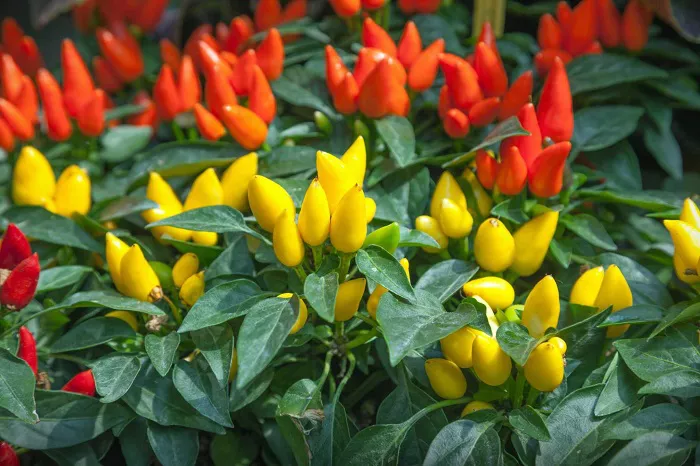Ornamental pepper plants are a delightful addition to any garden, offering vibrant colors and unique shapes that can brighten up even the dullest of spaces. These plants are not only visually appealing but also relatively low – maintenance, making them a popular choice for both novice and experienced gardeners. Understanding their lifespan can help you better plan your garden layout and ensure these charming plants thrive for as long as possible. In this article, we will delve into the factors that influence the longevity of ornamental pepper plants and provide tips on how to maximize their lifespan.
Lifespan of Ornamental Pepper Plants
Ornamental pepper plants typically have a lifespan of one to three years. While they are often grown as annuals, with many gardeners replanting them each year, they can actually survive for multiple seasons under the right conditions. In warmer climates, where temperatures remain consistently above freezing, these plants can thrive for several years. However, in regions with harsh winters, they are more likely to be treated as annuals, as freezing temperatures can severely damage or kill them.
Factors Affecting Lifespan
Several factors play a crucial role in determining how long ornamental pepper plants will live. These include climate, soil conditions, watering practices, and pest management.
Climate
Climate is one of the most significant factors influencing the lifespan of ornamental pepper plants. These plants thrive in warm temperatures, ideally between 65 and 80 degrees Fahrenheit. In regions with mild winters, they can survive outdoors year – round. However, in areas with freezing temperatures, it is essential to protect them from frost or bring them indoors during the colder months. If you live in a colder climate and want to extend the life of your ornamental pepper plants, consider growing them in containers. This way, you can easily move them indoors when the weather turns cold.
Soil Conditions
The quality of the soil is another critical factor. Ornamental pepper plants prefer well – drained soil that is rich in organic matter. Poorly drained soil can lead to root rot, a condition that can significantly shorten the plant’s lifespan. To ensure proper drainage, consider amending the soil with compost or other organic materials. Additionally, maintaining a slightly acidic soil pH, around 6.0 to 6.8, can help promote healthy growth and longevity.
Watering Practices
Proper watering is essential for the health and longevity of ornamental pepper plants. These plants require consistent moisture but do not like to sit in water. Overwatering can lead to root rot, while underwatering can cause the leaves to wilt and the plant to become stressed. To strike the right balance, water the plants deeply but infrequently, allowing the soil to dry out slightly between waterings. A good rule of thumb is to water when the top inch of soil feels dry to the touch.
Pest Management
Pests and diseases can also impact the lifespan of ornamental pepper plants. Common pests include aphids, spider mites, and whiteflies. These insects can damage the leaves and stems, reducing the plant’s ability to photosynthesize and grow. To prevent pest infestations, regularly inspect your plants for signs of damage or insect activity. If you notice any pests, treat them promptly with an appropriate insecticide or organic control method. Additionally, practicing good garden hygiene, such as removing dead leaves and debris, can help prevent the spread of diseases.
Maximizing Lifespan
While the natural lifespan of ornamental pepper plants is limited, there are several steps you can take to maximize their longevity. These include proper care, pruning, and overwintering.
Proper Care
Providing the right growing conditions is crucial for extending the life of your ornamental pepper plants. In addition to the factors mentioned above, ensure that your plants receive adequate sunlight. These plants thrive in full sun, requiring at least six to eight hours of direct sunlight per day. If you are growing them indoors, place them near a sunny window or use grow lights to supplement their light needs.
Pruning
Pruning can also help promote healthy growth and extend the lifespan of ornamental pepper plants. Regularly removing dead or damaged leaves and stems can improve air circulation and reduce the risk of disease. Additionally, pruning can encourage the plant to produce new growth, resulting in a fuller and more attractive appearance. Be sure to use clean, sharp tools when pruning to avoid damaging the plant.
Overwintering
If you live in a region with cold winters, overwintering your ornamental pepper plants can help ensure their survival. To do this, bring the plants indoors before the first frost and place them in a bright, cool location. Reduce watering during the winter months, allowing the soil to dry out slightly between waterings. With proper care, your plants should survive the winter and be ready to thrive again once the weather warms up.
Conclusion
Ornamental pepper plants are a beautiful and versatile addition to any garden. While their natural lifespan is relatively short, with proper care and attention, you can extend their life and enjoy their vibrant colors and unique shapes for several years. By understanding the factors that influence their longevity and taking steps to maximize their health, you can ensure that these charming plants remain a highlight of your garden for seasons to come.


